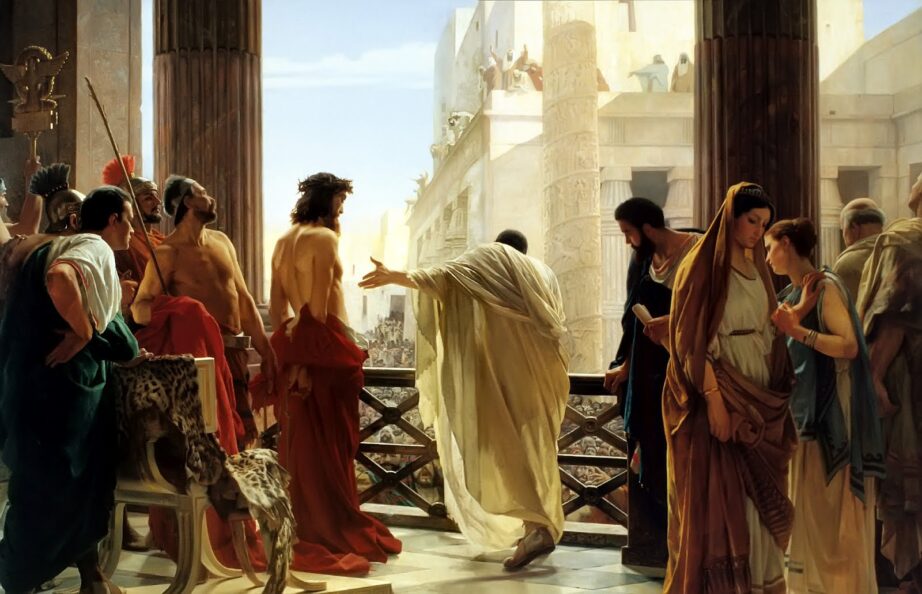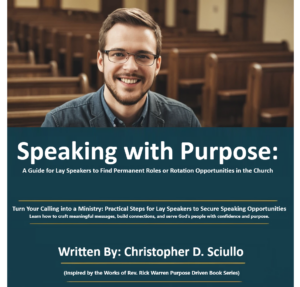During the first few verses of Luke Chapter 23, you will find that Jesus is being treated unfairly by Herod. You will also see that Pilate is thinking of having a way for Jesus to escape death. Jesus responds to these situations and tells them that salvation is the gift of God.
Luke 23: 1 – 49 Christ’s Trial and Crucifixion
23 Then the whole assembly rose and led him off to Pilate. 2 And they began to accuse him, saying, “We have found this man subverting our nation. He opposes payment of taxes to Caesar and claims to be Messiah, a king.”
3 So Pilate asked Jesus, “Are you the king of the Jews?”
“You have said so,” Jesus replied.
4 Then Pilate announced to the chief priests and the crowd, “I find no basis for a charge against this man.”
5 But they insisted, “He stirs up the people all over Judea by his teaching. He started in Galilee and has come all the way here.”
6 On hearing this, Pilate asked if the man was a Galilean. 7 When he learned that Jesus was under Herod’s jurisdiction, he sent him to Herod, who was also in Jerusalem at that time.
8 When Herod saw Jesus, he was greatly pleased, because for a long time he had been wanting to see him. From what he had heard about him, he hoped to see him perform a sign of some sort. 9 He plied him with many questions, but Jesus gave him no answer. 10 The chief priests and the teachers of the law were standing there, vehemently accusing him. 11 Then Herod and his soldiers ridiculed and mocked him. Dressing him in an elegant robe, they sent him back to Pilate. 12 That day Herod and Pilate became friends—before this they had been enemies.
13 Pilate called together the chief priests, the rulers and the people, 14 and said to them, “You brought me this man as one who was inciting the people to rebellion. I have examined him in your presence and have found no basis for your charges against him. 15 Neither has Herod, for he sent him back to us; as you can see, he has done nothing to deserve death. 16 Therefore, I will punish him and then release him.” [17] [a]
18 But the whole crowd shouted, “Away with this man! Release Barabbas to us!” 19 (Barabbas had been thrown into prison for an insurrection in the city, and for murder.)
20 Wanting to release Jesus, Pilate appealed to them again. 21 But they kept shouting, “Crucify him! Crucify him!”
22 For the third time he spoke to them: “Why? What crime has this man committed? I have found in him no grounds for the death penalty. Therefore I will have him punished and then release him.”
23 But with loud shouts they insistently demanded that he be crucified, and their shouts prevailed. 24 So Pilate decided to grant their demand. 25 He released the man who had been thrown into prison for insurrection and murder, the one they asked for, and surrendered Jesus to their will.
The Crucifixion of Jesus
26 As the soldiers led him away, they seized Simon from Cyrene, who was on his way in from the country, and put the cross on him and made him carry it behind Jesus. 27 A large number of people followed him, including women who mourned and wailed for him. 28 Jesus turned and said to them, “Daughters of Jerusalem, do not weep for me; weep for yourselves and for your children. 29 For the time will come when you will say, ‘Blessed are the childless women, the wombs that never bore and the breasts that never nursed!’ 30 Then
“‘they will say to the mountains, “Fall on us!”
and to the hills, “Cover us!”’[b]
31 For if people do these things when the tree is green, what will happen when it is dry?”
32 Two other men, both criminals, were also led out with him to be executed. 33 When they came to the place called the Skull, they crucified him there, along with the criminals—one on his right, the other on his left. 34 Jesus said, “Father, forgive them, for they do not know what they are doing.”[c] And they divided up his clothes by casting lots.
35 The people stood watching, and the rulers even sneered at him. They said, “He saved others; let him save himself if he is God’s Messiah, the Chosen One.”
36 The soldiers also came up and mocked him. They offered him wine vinegar 37 and said, “If you are the king of the Jews, save yourself.”
38 There was a written notice above him, which read: this is the king of the jews.
39 One of the criminals who hung there hurled insults at him: “Aren’t you the Messiah? Save yourself and us!”
40 But the other criminal rebuked him. “Don’t you fear God,” he said, “since you are under the same sentence? 41 We are punished justly, for we are getting what our deeds deserve. But this man has done nothing wrong.”
42 Then he said, “Jesus, remember me when you come into your kingdom.[d]”
43 Jesus answered him, “Truly I tell you, today you will be with me in paradise.”
The Death of Jesus
44 It was now about noon, and darkness came over the whole land until three in the afternoon, 45 for the sun stopped shining. And the curtain of the temple was torn in two. 46 Jesus called out with a loud voice, “Father, into your hands I commit my spirit.”[e] When he had said this, he breathed his last.
47 The centurion, seeing what had happened, praised God and said, “Surely this was a righteous man.” 48 When all the people who had gathered to witness this sight saw what took place, they beat their breasts and went away. 49 But all those who knew him, including the women who had followed him from Galilee, stood at a distance, watching these things.
Herod’s treatment of Jesus
Having the chance to see Jesus was something that Herod wanted for a long time. However, he did not show a genuine interest in the Savior. He mocked Jesus and treated him contemptuously. He then sent him back to Pilate.
Pilate and Herod were enemies for a long time. In fact, they had been enemies even before Jesus’ trial. The Synoptic Gospels portray both Pilate and Herod as unjust judges, lacking self-control and lacking piety. This portrayal helps in apologetic purposes.
Pilate had tried four different ways to avoid condemning Jesus. He did not want to offend the Jews and wanted someone else to take the blame for the decision. He was also concerned that condemning Jesus would undermine impartial justice.
Pilate’s belief that he had a way for Jesus to escape death
During the time of Jesus, Pontius Pilate was the Roman Governor of Judea. He was an influential man and had the power to crucify a criminal. He also had a lot of authority over the monetary system and the collection of taxes. He was also a military general.
Pilate was a very successful man by the standards of the day. He was an able leader who had the courage to stand up to the world. He had the power to appoint a high priest, Since he was the Roman Governor, he had the responsibility to keep peace in Judea. He also had a chance to save Jesus from death. He also had the opportunity to put the religious leaders in their place.
Pilate believed that Jesus was innocent and had no crime. He believed that he was the Son of God. The chief priests, however, wanted to kill Jesus. They wanted to accuse him of blasphemy. They also wanted to put him on a crucifixion.
Jesus’ response to the criminal
Having said that, a criminal’s response to Jesus’ words on the cross served as a launching point for Luke’s gospel. It also served to build Luke’s image of Jesus as the faithful son of God.
It is easy to see that Jesus had prepared for all the things that would befall him, including his own betrayal. He had his inner circle in place, and he was prepared for the failure of his friends. He was prepared to endure the physical pain of the crucifixion, as well as the mental torture that would follow. He had learned the true cost of his mission.
One would have to wonder why the centurion did not mention the name of the crime he was convicted of, but that is another story. He is hardly mentioned in any detail in the Gospel of Matthew, and in Mark there is only one verse dedicated to the criminal.
Jesus’ point that salvation is always the gift of God
Whether you are a Christian or not, there is no question that Jesus’ point that salvation is always the gift of God is a powerful statement. The Bible tells us that only Jesus Christ can give us eternal life. This is because Jesus is God’s only Son. He had to be sacrificed in order to pay the penalty for our sins. This is the only way for everyone to have eternal life.
There is more to salvation than just believing in Jesus. We have to make sure that we turn away from our sins and turn to God. When we do this, we will become a part of God’s family. This is a very important concept because God loves us unconditionally.
There are several things that people can do to show God their love. One way to do this is to purchase gifts for other people. There are several Greek words that are translated as gift in the New Testament. These words are used in other contexts other than reciprocal gift-giving.
Jesus’ response to a crowd of people
During the crucifixion, there is a moment when Jesus responds to a crowd of people. His response is unique to Luke and he has prompted ongoing debate about its authenticity.
Jesus says, “Father, forgive them, for they do not know what they are doing.” He was speaking of the people involved in his murder, not just those who cried out, “Crucify him!”.






